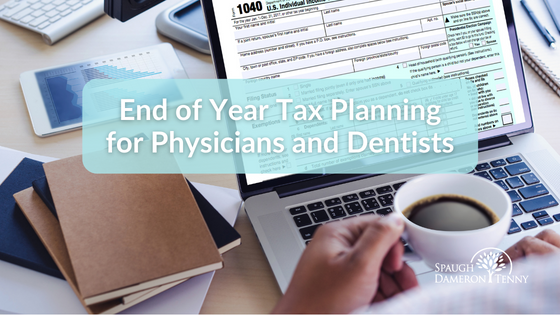With so much to look forward to during the holiday season, it is easy for busy professionals like physicians and dentists to overlook what they can do to prepare financially for the end of the year. Not all is lost, though, there is still time left to take stock of your financial situation. As the year comes to a close, you may want to review what you can do in the last few weeks of the year and what should wait until the new year. Many end-of-year tax strategies need to be implemented by December 31 to have an effect on tax filing in the following spring.

Here are a few tips to help you get the most from your taxes!
You may be able to reduce your taxable income as well as build your nest egg by making contributions to your retirement savings account. Depending on your situation, it can be a missed opportunity not to contribute as much as you are able for the year.
Tax-deductible contributions are capped at the following levels for 2022
Remember, according to our Financial Priority Pyramid Planning - by creating a saving plan, you will be able to make a better financial plan to meet your financial goals.
Pro Tip: Did you know that you have until April 15 of next year to make tax-deductible contributions to Traditional IRAs and Health Saving Accounts? However, it is important to note that the window for 401(k) contributions ends on December 31.
Do you have a charitable giving plan that aligns with what you value and is tax-efficient? With the winter season quickly approaching, it is a good time to clean out your closets and go through your household goods to see what you need and can donate. Your donation of goods or clothing may not seem like much, but it can make a difference to an organization that works with individuals or families in need. Similarly, year-end giving is another way you can help support your place of worship and favorite non-profit organization in your community.
Have you reviewed your taxable investments to see if you have stocks in your portfolio that have gone down in value? It is possible to recognize your losses and use them to offset investment winners. You may want to consider selling the losing investment and offsetting your losses against any gains you recognized. If the losses exceed the gains, you can deduct up to $3,000 on your federal taxes.
If you have a Flexible Spending Account (FSA) and there is money remaining, schedule those outstanding health care visits. While the old “use it or lose it” rule may not still apply, you may only be able to carry over $570 worth of unused money left in your 2022 FSA account at year’s end. Another consideration is whether your plan limits the amount of time you are allowed to use your funds to 2 ½ months after the plan year.
Other Dependent Credit, or ODC, is something that many of us overlook. If you support your parents or grandparents, they may qualify as a non-child dependent. Meaning you should investigate taking advantage of the new “Other Dependent Credit” worth up to $500.
Ask yourself if you pay home property taxes, pay state taxes, or did you make a large purchase and pay quite a bit of sales tax. You can still deduct the amount of state and local property, income, or sales taxes up to $10,000. In the past, these taxes have generally been fully tax-deductible, but every situation is unique, so working with a tax advisor can help you understand what applies and does not apply to you.
The last two months of the year are typically a good time to meet with your tax advisor to have a financial checkup. They have finished their October tax filings and may have time in their schedule before the busy tax season begins after the new year. As your expenses and income may fluctuate during the year, it can be helpful to understand where you are on- and off-target when it comes to your financial plan before year-end. A tax advisor can provide advice on strategies to minimize taxes owed while staying within the bounds of the law and regulations.
Check out this blog - Year-End Tax Planning Tips for Dental Practice Owners - that our friends over at The Dental CFO wrote.
The end of the year is a good time to review your financial accounts and plans. In some cases, the last day of December is a key deadline, so it can make sense to do some year-end financial housekeeping. Of course, checking on your finances is not a one-and-done exercise. Just like maintenance on your car or HVAC system, it can be beneficial to set aside time to review your financial strategies throughout the year.
If you need help organizing your finances, a Spaugh Dameron Tenny financial planner is here to help you build a plan that is designed for you and your needs. Book a meeting with one of our planners to get started today.
CRN202511-3343947

Shane Tenny is the managing partner of Spaugh Dameron Tenny. Along with hosting the Prosperous Doc® podcast, Shane has a true passion for behavioral finance, helping clients and audiences understand how to develop successful strategies based on their unique temperaments. An accomplished and highly engaging speaker, Shane is regularly interviewed for television and podcasts, is actively involved in the Financial Planning Association®, and contributes to industry advisory boards.
At Spaugh Dameron Tenny, we take our role of helping our clients grow and protect their wealth seriously. We believe that a disciplined approach is ...
Read More →Joining your life with someone else can be joyous and stressful. Most newly married couples focus on the "fun" parts of marriage, like companionship, ...
Read More →Employing your children in your dental practice can be a decision laden with both potential benefits and challenges. Let's delve into the nuanced ...
Read More →